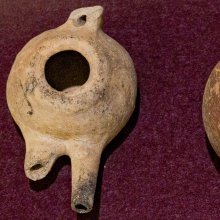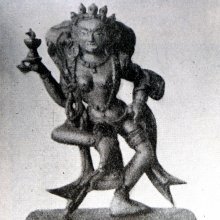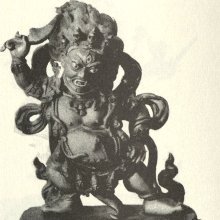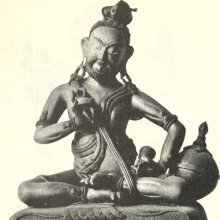Dipa, Dīpa: 32 definitions
Introduction:
Dipa means something in Buddhism, Pali, Hinduism, Sanskrit, Jainism, Prakrit, Marathi, Hindi. If you want to know the exact meaning, history, etymology or English translation of this term then check out the descriptions on this page. Add your comment or reference to a book if you want to contribute to this summary article.
Dipa has 31 English definitions available.
Images (photo gallery)
(+12 more images available)
Languages of India and abroad
Sanskrit dictionary
[Deutsch Wörterbuch]
Source: Cologne Digital Sanskrit Dictionaries: Böhtlingk and Roth Grosses Petersburger WörterbuchDīpa (दीप):—(von dīp) m. Leuchte, Lampe [Amarakoṣa 2, 6, 3, 40.] [Trikāṇḍaśeṣa 2, 6, 42.] [Hemacandra’s Abhidhānacintāmaṇi 686.] [Medinīkoṣa Pāṇini’s acht Bücher 8.] [ĀŚV. GṚHY. 4, 8.] [Kauśika’s Sūtra zum Atuarvaveda 39. 69.] [ŚVETĀŚV. Upakośā 2, 15.] [Manu’s Gesetzbuch 4, 229.] yathā dīpo nivātastho neṅgate [Bhagavadgītā 6, 19.] [Mahābhārata 3, 13984.] [Indralokāgamana 1, 34.] kṣīṇasnehasya dīpasya [Daśaratha’s Tod 2, 68.] nirvāṇagandha [Rāmāyaṇa 3, 59, 16.] dīpo netrāntarasyeva pratikūlāsi me dṛḍham [6, 100, 17.] [Suśruta 1, 71, 8. 110, 13.] dīpaṃ cāpi na marṣayedabhimukham [Mṛcchakaṭikā 48, 25.] [Bhartṛhari 3, 81. 89.] niśītha [Raghuvaṃśa 3, 15. 5, 37.] [Kathāsaritsāgara 4, 64. 21, 85.] Am Ende eines adj. comp. f. ā [Suśruta 1, 40, 7.] [Kathāsaritsāgara 15, 38. 41.] — Vgl. jagaddīpa .
--- OR ---
Dīpa (दीप):—Leuchte in übertr. Bed. von bestimmten erleuchteten Zuständen eines Yogin: pañcaka (citradīpa, tṛpti, kūṭastha, dhyāna, nāṭaka) Titel eines Abschnittes in der Pañcadaśī [Oxforder Handschriften 222,b,14. fgg.]
Source: Cologne Digital Sanskrit Dictionaries: Sanskrit-Wörterbuch in kürzerer FassungDīpa (दीप):—m. (adj. Comp. f. ā) —
1) Leuchte , Lampe. —
2) in der Astr. der leuchtende Körper (in Bezug auf den Gnomon) Comm. zu [Āryabhaṭa 2,15.] [Bhāskara’s Līlāvatī .S.95]; vgl. [Colebrooke 108.] —
3) Bez. bestimmter erleuchteter Zustände eines Yogin.
Sanskrit, also spelled संस्कृतम् (saṃskṛtam), is an ancient language of India commonly seen as the grandmother of the Indo-European language family (even English!). Closely allied with Prakrit and Pali, Sanskrit is more exhaustive in both grammar and terms and has the most extensive collection of literature in the world, greatly surpassing its sister-languages Greek and Latin.
See also (Relevant definitions)
Starts with (+158): Dipa Sutta, Dipa Vihara, Dipa-shule, Dipa-skambha, Dipabhajana, Dipaca Kavada, Dipacandi, Dipacci, Dipada, Dipadadhipati, Dipadana, Dipadanakarika, Dipadanapaddhati, Dipadanaratna, Dipadanavidhi, Dipadanda, Dipadarshana, Dipadhari, Dipadharini, Dipadhuma.
Ends with (+352): Abhayadipa, Acaradipa, Acarapradipa, Acharadipa, Adhyatmapradipa, Adidipa, Advaitatattvadipa, Ahidipa, Ahnikapradipa, Ajyadipa, Akashadipa, Akashajnanarthapradipa, Akashapradipa, Akhanda-dipa, Alamkarakulapradipa, Anadipa, Antaraladipa, Antardipa, Anumaranapradipa, Apradipa.
Full-text (+336): Dipakitta, Dipadhvaja, Meghadipa, Dipabhajana, Dipamala, Madhudipa, Daivadipa, Devadipa, Acaradipa, Dipali, Dipapadapa, Dipavriksha, Dipapuja, Dipapushpa, Akashadipa, Dipankara, Jagaddipa, Dipamkarajnana, Dipashrinkhala, Karmadipa.
Relevant text
Search found 68 books and stories containing Dipa, Dīpa, Dīpā; (plurals include: Dipas, Dīpas, Dīpās). You can also click to the full overview containing English textual excerpts. Below are direct links for the most relevant articles:
The Skanda Purana (by G. V. Tagare)
Chapter 30 - Offering Lights to Anarakeśvara < [Section 1 - Avantīkṣetra-māhātmya]
Chapter 240 - Devotion Explained < [Section 1 - Tīrtha-māhātmya]
Chapter 239 - Efficacy of Adoration, Penance etc. < [Section 1 - Tīrtha-māhātmya]
Garga Samhita (English) (by Danavir Goswami)
Verse 4.8.24 < [Chapter 8 - In the Story of the Yajña-sītās, the Glories of Ekādaśī]
Verse 2.1.7 < [Chapter 1 - Description of the Entrance in Vṛndāvana]
Verse 4.19.3b < [Chapter 19 - A Thousand Names of Srī Yamunā]
Dhammapada (Illustrated) (by Ven. Weagoda Sarada Maha Thero)
Verse 25 - The Story of Cūlapanthaka < [Chapter 2 - Appamāda Vagga (Heedfulness)]
Verse 235-238 - The Story of the Son of a Butcher < [Chapter 18 - Mala Vagga (Impurities)]
Later Chola Temples (by S. R. Balasubrahmanyam)
Appendix: Naralokavira’s Chidambaram Inscription < [Chapter II - Temples of Kulottunga I’s Time]
The Indian Buddhist Iconography (by Benoytosh Bhattachacharyya)
Figure 213 - Four Light Goddesses: Dīpā
Figure 105-108 - (Avalokiteśvara): Lokanātha
Shrimad Bhagavad-gita (by Narayana Gosvami)
Verse 6.19 < [Chapter 6 - Dhyāna-yoga (Yoga through the Path of Meditation)]





